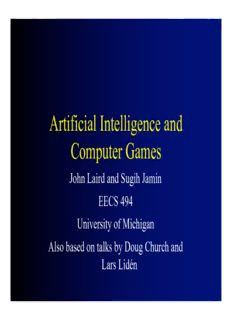
Lecture 12 AI in Games PDF
Preview Lecture 12 AI in Games
Artificial Intelligence and Computer Games John Laird and Sugih Jamin EECS 494 University of Michigan Also based on talks by Doug Church and Lars Lidén What is AI? • The term AI is broadly used in computer games • Behave rationally: Use available knowledge to maximize goal achievement. • Often leads to optimization techniques. • A set of capabilities: Problem solving, learning, planning, ... • Different game genre employs different techniques Roles of AI in Games • Opponents • Teammates • Strategic Opponents • Support Characters • Autonomous Characters • Commentators • Camera Control • Plot and Story Guides/Directors AI Provides • Character, Emotion • Understanding Environments • Solving Logic, Resolving Rules • Decision making, w/Attitude Bias • Not yet “virtual people”, as such AI Roles in Games Game Genres AI Roles Racing Other cars Fighting Other fighters Action/FPS Enemies, allies RPG Monsters, party members Adventure Strategy Strategic Enemies Simulation Units Sports Commentators, camera Obvious Examples Situations where “AI” might be, could be, should be, and is used in Games • Car Game – write a virtual driver • Shooter – write a virtual player • Sports Games – write a virtual coach • RTS – write a virtual general Racing Opponents • Originally follow course “on rails” • Next allow different speeds in curves, hills, … • Finally, control vehicle using game physics • Use human play traces • Provide variety and skill levels with different humans • Transition between trace following and respond to dynamics • Powerups, human player, … • Attempt to have driver “personality” • What makes for a “fun” racing game? Making a “fun” racing game • As designers, we want to recreate racing, not just driving around on a track • Competition is a crucial part of that • Need to increase likelihood of a close race • So we could count on players getting good or, essentially, we could cheat How do we cheat well? • We have to slow down the front, speed up the back • Easiest way is just with speed • Cars in front slow down, in back, speed up • Rubber banding near player makes it challenging • However, this can be very obvious to players • Violate “fairness” and “consistency” • And, worse, risks removing player’s feel of interaction Dynamic Difficulty Adjustment • Game monitors player behavior • As player struggles, game changes to try and help the player through it • If player does well, game becomes harder • Examples?
Description: